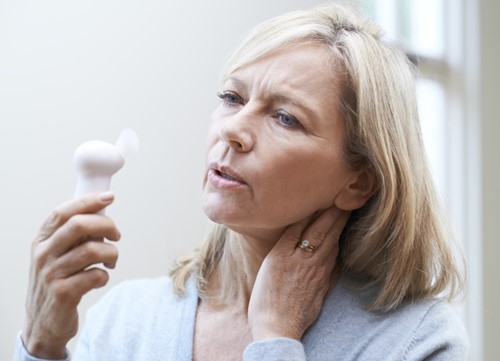Reaching post-menopause should be a liberating experience, no more having to think about periods or even contraception.
Even though you might still feel a little low, we hope you’re over the worst of those perimenopausal symptoms – what a nightmare that was! Still, it can be a little hard to see the wood for the trees after the huge drop in hormone levels, so here’s what we think you need to know post-menopause.

First off, your life is most certainly not over, you’re just entering another phase of womanhood and a pretty empowering one too!
We like the Chinese approach as they refer to the menopause as “a second spring” to celebrate a woman’s midlife wisdom, confidence and enlightenment. A belief that with age comes a naturally earned respect based on life experiences, knowledge and a more surefooted approach to the everyday. An acceptance and embracing of ageing and change.
Looking after yourself is key to coping post-menopause. To help your body redress the balance resulting from the drop in those hormone levels, it’s really important to be mindful of your overall health. There can be some long-term health issues associated with post-menopause and while you may not suffer from them, it’s important to be aware of them.
However, both can be alleviated by some simple lifestyle adjustments, such as undertaking regular exercise and maintaining a well-balanced diet. Unfortunately, ‘lifestyle adjustments’ does include limiting alcohol intake and smoking but remember to take it one step at a time… no-one’s expecting you to become a saint overnight!
Should you be concerned about any of the above or experience any discomfort, pain, swelling or bleeding after the menopause, please do make sure you make an appointment to see your doctor straight away.
Well let's get the first one ticked off the list - no more periods, and that awful unpredictability that comes in the peri-menopause phase when your period is all over the place. But what else could you expect once your periods have ended for good.
Don’t feel you have to struggle while managing menopause. There is help available and getting the right treatment could transform your menopause experience from miserable into manageable. Here’s some helpful tips to get you through:
With all of the above, remember to check with your doctor before trying something new, they may help you balance out the pro’s and con’s or even give you some other recommendations.
Remember you’re unique but not alone. It’s important to talk and not suffer in silence. There are treatments, advice and support groups available to help alleviate the symptoms of menopause and help you cope post-menopause, so don’t be afraid to reach out if you need help.
Don’t underestimate it —menopause can be a profound and multifaceted experience. It’s not just a physical transition but an emotional and psychological one as well. The end of the childbearing years, whether you chose to have children or not can bring up a range of feelings, from relief and freedom to grief and loss. It’s important to recognise and honour these emotions, as they are a valid part of the process.
But it’s important to see it as a time of opportunity and empowerment, the beginning of the next life-stage. After all, no one knows you better than you! Why not take up new interests, be interested and interesting, enlightened and full of purpose. Ready to take on the next challenge. You’ve got this!
If you or someone you know is navigating this transition, and struggling it might be helpful to seek support from friends, family, or professionals who can offer guidance and understanding.

Join our community at Lil-Lets talk, the place to go if you’ve got questions on menopause, periods or absolutely anything else!
Lil-Lets TalkAs you go through menopause, your family might notice a few changes - some subtle, some a little more obvious.
How To Talk To Your Family About The MenopauseLearn all about the causes, symptoms and treatments of bladder weakness during menopause.
Bladder Weakness During MenopauseYour vaginal health is just as important pre and post menopause, but what changes should you expect?
Vaginal Dryness and Discharge In Menopause
The menopause is signified by not menstruating for 12 months, this usually occurs in your mid- fifties.
Although there’s no magic formula for hot flushes, we do know that stress can be a trigger. It may also be an idea to cut down on your consumption of caffeine and alcohol, since they can make hot flushes worse.
Yes! Once your hormones settle, many women report feeling more energetic and focused. If fatigue is an issue, regular movement, good nutrition, and quality sleep can make a huge difference.
Yes, often with families now living independently, it's your time—whether it’s exploring new hobbies, traveling, reconnecting with old passions, or prioritizing self-care. Think of it as a new chapter filled with possibility.
Whilst osteoporosis can be an issue post-menopause, with strength training, yoga, you can keep muscles and bones strong. And many women actually feel fitter and healthier post-menopause because they focus on overall well-being rather than just menstrual cycles.
For some women, intimacy improves because there’s no concern about pregnancy or period-related discomfort. If dryness is an issue, there are plenty of solutions—like lubricants or vaginal oestrogen—so pleasure can still be a fulfilling part of life.
The mood swings of the perimenopause phase, often diminishes post-menopause as hormone levels regulate. However, if you continue to experience mood swings, lifestyle changes, therapy, or supplements (like magnesium and omega-3s) can help.
The memory lapses, trouble focusing and general mental fatigue experienced during perimenopause should start to disappear after a year or two (earlier for some women) as once fluctuating oestrogen levels have stabilised. Lifestyle changes can speed up the process and improve mental sharpness.